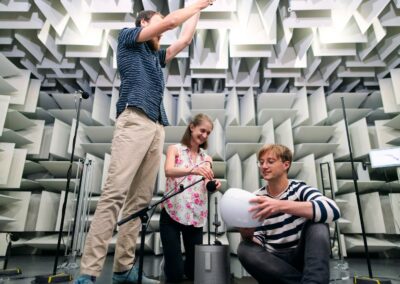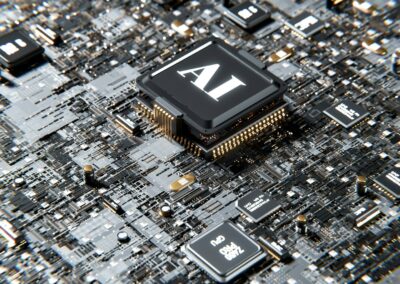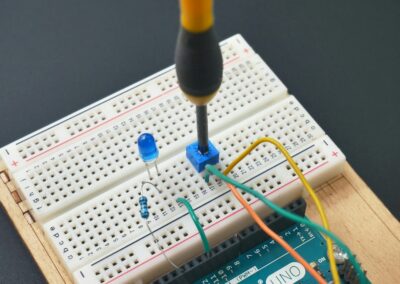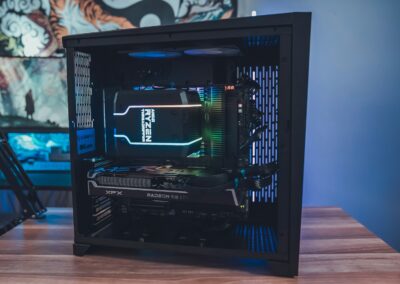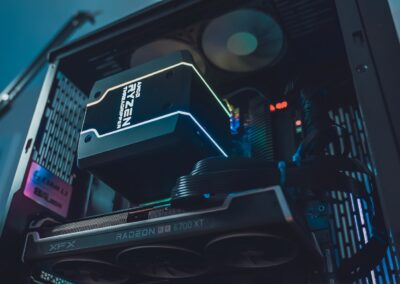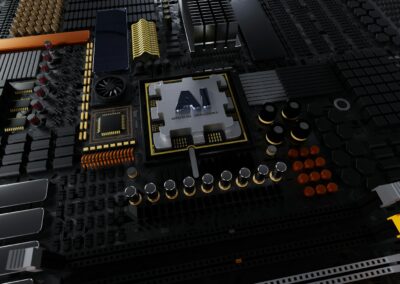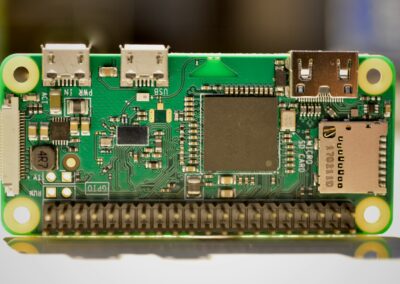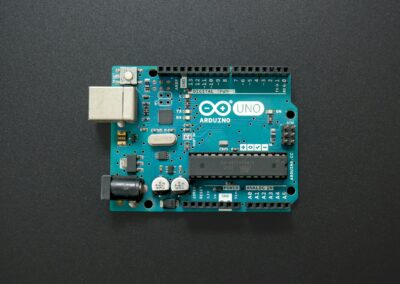The Role of Neuromorphic Computing in Advanced AI Systems
Understanding Neuromorphic Computing
Neuromorphic computing for AI learning is revolutionizing the development of systems capable of unsupervised and reinforcement learning by mimicking the brain’s neural architecture. This innovative approach leverages the principles of neuroscience to create hardware and software that function similarly to human brains, enabling more efficient and adaptive AI systems. In regions like Saudi Arabia and the UAE, where technological advancement is a priority, neuromorphic computing presents an exciting opportunity to enhance AI capabilities and drive business success.
At its core, neuromorphic computing involves designing computer systems with neural networks that emulate the structure and function of biological neurons. These systems use spiking neural networks (SNNs), which process information through spikes of electrical activity, akin to how neurons communicate in the human brain. This allows for more efficient data processing, lower power consumption, and the ability to learn and adapt from environmental inputs. This technology is particularly relevant in technologically progressive cities like Riyadh and Dubai, where there is a strong emphasis on smart technologies and AI integration.
Neuromorphic computing’s design inherently supports unsupervised and reinforcement learning. Unsupervised learning allows AI systems to identify patterns and structures in unlabelled data autonomously, while reinforcement learning enables systems to learn from interactions with their environment through rewards and penalties. This brain-like learning capability makes neuromorphic computing an ideal foundation for developing advanced AI systems that can operate independently and improve over time without constant human supervision.
Enabling Unsupervised Learning
Unsupervised learning is a type of machine learning where AI systems analyze and identify patterns in unlabelled data without human intervention. Neuromorphic computing significantly enhances the capabilities of AI to perform unsupervised learning by leveraging the brain’s natural learning processes. This approach enables AI systems to autonomously detect anomalies, categorize data, and make predictions, making them highly valuable for applications in various industries.
In neuromorphic systems, unsupervised learning is facilitated through mechanisms such as Hebbian learning, which follows the principle that “neurons that fire together wire together.” This principle allows the system to strengthen connections between neurons that frequently activate simultaneously, thereby learning patterns and associations from raw data. This biological approach to learning makes neuromorphic systems highly efficient at processing vast amounts of data and identifying underlying structures without needing extensive labeled datasets.
For businesses in Riyadh and Dubai, the ability to deploy AI systems capable of unsupervised learning offers significant advantages. These systems can continuously improve their performance, making them ideal for applications in finance, healthcare, and smart city management, where real-time data processing and decision-making are critical. By implementing neuromorphic computing principles, companies can develop more intelligent and autonomous systems, driving innovation and competitive advantage.
Facilitating Reinforcement Learning
Reinforcement learning is another area where neuromorphic computing excels. This learning paradigm involves training AI systems to make decisions by rewarding desirable behaviors and penalizing undesirable ones. Neuromorphic systems, with their brain-like architecture, are particularly well-suited for reinforcement learning as they can adaptively respond to environmental feedback and optimize their actions to achieve specific goals.
In neuromorphic computing, reinforcement learning is implemented through reward-based mechanisms that adjust the synaptic weights between neurons based on the received feedback. This allows the AI to learn from trial and error, gradually improving its performance in tasks such as robotic control, autonomous navigation, and game playing. The ability to learn and adapt in real-time makes neuromorphic AI systems highly effective for complex and dynamic environments.
Industries in Saudi Arabia and the UAE, particularly those involved in automation and robotics, can greatly benefit from neuromorphic reinforcement learning. For example, autonomous vehicles and drones can use these AI systems to navigate safely and efficiently in urban environments, enhancing transportation and logistics operations. Similarly, industrial robots can optimize their tasks through reinforcement learning, increasing productivity and reducing operational costs.
Applications and Benefits in Business and Technology
Transforming Business Operations
Neuromorphic computing for AI learning is transforming business operations by providing advanced tools to enhance efficiency, accuracy, and innovation. In regions like Saudi Arabia and the UAE, industries such as finance, healthcare, and urban development are leveraging these AI advancements to stay ahead in a competitive global market. Neuromorphic systems offer superior processing capabilities, enabling faster and more accurate data analysis, which is crucial for making informed business decisions.
In the finance sector, neuromorphic AI can analyze market trends, detect fraud, and optimize trading strategies in real-time. By learning from unstructured financial data, these systems can provide insights that are not immediately apparent through traditional methods. This leads to better risk management and more strategic investment decisions, driving financial growth and stability. For financial hubs like Riyadh and Dubai, adopting neuromorphic AI can significantly enhance their global competitiveness.
The healthcare industry also benefits immensely from neuromorphic computing. AI systems designed with neuromorphic principles can process vast amounts of medical data, identify patterns, and assist in diagnosing diseases. These systems can continuously learn from new medical records, adapting to emerging health trends and improving diagnostic accuracy. This capability is particularly valuable in delivering personalized medicine and enhancing patient care, making healthcare systems in the UAE and Saudi Arabia more responsive and effective.
Integrating Blockchain and The Metaverse
Blockchain technology and The Metaverse are two cutting-edge areas where neuromorphic computing can have a significant impact. Blockchain’s secure and transparent ledger system can be enhanced with neuromorphic AI to improve the efficiency and security of financial transactions and data sharing. Neuromorphic systems can monitor blockchain networks in real-time, identifying anomalies and potential security threats, thus ensuring the integrity of transactions.
The Metaverse, a virtual shared space that combines physical and digital realities, can leverage neuromorphic computing for more immersive and interactive experiences. Neuromorphic systems can process sensory data more effectively, enabling more realistic virtual environments and interactions. This technology can be applied in various fields, including entertainment, education, and virtual collaboration, offering new opportunities for businesses and consumers in Riyadh and Dubai to engage with digital content in innovative ways.
Furthermore, the integration of neuromorphic AI with Blockchain technology can enhance the security and transparency of transactions within the Metaverse. Blockchain can ensure that all virtual interactions and transactions are securely recorded, while neuromorphic AI can monitor and analyze these activities in real-time, identifying potential security threats and ensuring the integrity of the digital space. This combination of technologies provides a robust foundation for developing and maintaining a secure and vibrant Metaverse ecosystem.
Driving Business Success Through Leadership and Management
Effective leadership and management are crucial for leveraging neuromorphic computing to drive business success. Leaders in Saudi Arabia and the UAE must understand the potential and limitations of these technologies to make strategic decisions that benefit their organizations. This involves not only investing in the right technologies but also fostering a culture of innovation and continuous learning.
Project management skills are essential for successfully implementing neuromorphic AI systems. This includes planning, executing, and monitoring AI projects to ensure they meet organizational goals and deliver expected outcomes. Effective project managers must be able to coordinate cross-functional teams, manage resources efficiently, and mitigate risks associated with technology integration. By mastering these skills, leaders can ensure that their organizations remain competitive and agile in the rapidly evolving technological landscape.
Furthermore, change leadership is critical for navigating the transitions brought about by AI and neuromorphic computing. Leaders must be able to communicate the benefits and implications of these technologies to their teams, addressing concerns and building buy-in. By fostering an environment that embraces change and innovation, leaders can drive the successful adoption of neuromorphic AI systems, enhancing their organization’s capabilities and achieving long-term success.
Conclusion
In conclusion, neuromorphic computing for AI learning offers transformative potential for AI systems, enabling them to learn and adapt more efficiently and effectively. By addressing the challenges and seizing the opportunities presented by this technology, businesses in Saudi Arabia and the UAE can drive innovation and maintain a competitive edge. The integration of advanced technologies such as AI, Blockchain, and The Metaverse further enhances the potential for business success. Through strategic implementation, effective leadership, and continuous learning, organizations can leverage neuromorphic engineering to achieve significant advancements in various sectors and ensure sustained growth in a dynamic technological landscape.
#NeuromorphicComputing #AI #UnsupervisedLearning #ReinforcementLearning #BusinessSuccess #SaudiArabia #UAE #Riyadh #Dubai #Blockchain #TheMetaverse #GenerativeAI #ModernTechnology #Leadership #ManagementSkills #ProjectManagement


